- Home
- Evelyn Waugh
Decline and Fall Page 2
Decline and Fall Read online
Page 2
Dr Fagan rose, put on his hat at a jaunty angle, and drew on a glove.
'Good‑bye, my dear Pennyfeather. I think, in fact I know, that we are going to work well together. I can always tell these things.
'Good‑bye, sir, said Paul….
'Five per cent of ninety pounds is four pounds ten shillings, said Mr Levy cheerfully. 'You can pay now or on receipt of your first term's salary. If you pay now there is a reduction of 15 per cent. That would be three pounds six shillings and sixpence.
'I'll pay you when I get my wages, said Paul.
'Just as you please, said Mr Levy. 'Only too glad to have been of use to you.
CHAPTER II Llanabba Castle
Llanabba Castle presents two quite different aspects, according as you approach it from the Bangor or the coast road. From the back it looks very much like any other large country house, with a great many windows and a terrace, and a chain of glass‑houses and the roofs of innumerable nondescript kitchen buildings, disappearing into the trees. But from the front ‑ and that is how it is approached from Llanabba station ‑ it is formidably feudal; one drives past at least a mile of machicolated wall before reaching the gates; these are towered and turreted and decorated with heraldic animals and a workable portcullis. Beyond them at the end of the avenue stands the Castle, a model of medieval impregnability.
The explanation of this rather striking contrast is simple enough. At the time of the cotton famine in the sixties Llanabba House was the property of a prosperous Lancashire millowner. His wife could not bear to think of their men starving; in fact, she and her daughters organized a little bazaar in their aid, though without any very substantial results. Her husband had read the Liberal economists and could not think of paying without due return. Accordingly 'enlightened self‑interest' found a way. An encampment of mill‑hands was settled in the park, and they were put to work walling the grounds and facing the house with great blocks of stone from a neighbouring quarry. At the end of the American war they returned to their mills, and Llanabba House became Llanabba Castle after a great deal of work had been done very cheaply.
Driving up from the station in a little closed taxi, Paul saw little of all this. It was almost dark in the avenue and quite dark inside the house.
'I am Mr Pennyfeather, he said to the butler. 'I have come here as a master.
'Yes, said the butler, 'I know all about you. This way.
They went down a number of passages, unlit and smelling obscurely of all the ghastly smells of school, until they reached a brightly lighted door.
'In there. That's the Common Room. Without more ado, the butler made off into the darkness.
Paul looked round. It was not a very big room. Even he felt that, and all his life he had been accustomed to living in constricted spaces.
'I wonder how many people live here, he thought, and with a sick thrust of apprehension counted sixteen pipes in a rack at the side of the chimneypiece. Two gowns hung on a hook behind the door. In a corner were some golf clubs, a walking stick, an umbrella, and two miniature rifles. Over the chimneypiece was a green baize notice‑board covered with lists; there was a typewriter on the table. In a bookcase were a number of very old textbooks and some new exercise‑books. There were also a bicycle pump, two armchairs, a straight chair, half a bottle of invalid port, a boxing‑glove, a bowler hat, yesterday's Daily News, and a packet of pipe‑cleaners.
Paul sat down disconsolately on the straight chair.
Presently there was a knock at the door, and a small boy came in.
'Oh! he said, looking at Paul intently.
'Hullo! said Paul.
'I was looking for Captain Grimes, said the little boy.
'Oh! said Paul.
The child continued to look at Paul with a penetrating, impersonal interest.
'I suppose you're the new master? he said.
'Yes, said Paul. 'I'm called Pennyfeather.
The little boy gave a shrill laugh. 'I think that's terribly funny, he said, and went away.
Presently the door opened again, and two more boys looked in. They stood and giggled for a time and then made off.
In the course of the next half hour six or seven boys appeared on various pretexts and stared at Paul.
Then a bell rang, and there was a terrific noise of whistling and scampering. The door opened, and a very short man of about thirty came into the Common Room. He had made a great deal of noise in coming because he had an artificial leg. He had a short red moustache, and was slightly bald.
'Hullo! he said.
'Hullo! said Paul.
'I'm Captain Grimes, said the newcomer, and 'Come in, you, he added to someone outside.
Another boy came in.
'What do you mean, said Grimes, 'by whistling when I told you to stop?
'Everyone else was whistling, said the boy.
'What's that got to do with it? said Grimes.
'I should think it had a lot to do with it, said the boy.
'Well, just you do a hundred lines, and next time, remember, I shall beat you, said Grimes, 'with this, said Grimes, waving the walking‑stick.
'That wouldn't hurt much, said the boy, and went out.
'There's no discipline in the place, said Grimes, and then he went out too.
'I wonder whether I'm going to enjoy being a schoolmaster, thought Paul.
Quite soon another and older man came into the room.
'Hullo! he said to Paul.
'Hullo! said Paul.
'I'm Prendergast, said the newcomer. 'Have some port?
'Thank you, I'd love to.
'Well, there's only one glass.
'Oh, well, it doesn't matter, then.
'You might get your tooth‑glass from your bedroom.
'I don't know where that is.
'Oh, well, never mind; we'll have some another night. I suppose you're the new master?
'Yes.
'You'll hate it here. I know. I've been here ten years. Grimes only came this term. He hates it already. Have you seen Grimes?
'Yes, I think so.
'He isn't a gentleman. Do you smoke?
'Yes.
'A pipe, I mean.
'Yes.
'Those are my pipes. Rernind me to show them to you after dinner.
At this moment the butler appeared with a message that Dr Fagan wished to see Mr Pennyfeather.
Dr Fagan's part of the Castle was more palatial. He stood at the end of a long room with his back to a rococo marble chimneypiece; he wore a velvet dinner‑jacket.
'Settling in? he asked.
'Yes, said Paul.
Sitting before the fire, with a glass bottle of sweets in her lap, was a brightly dressed woman in early middle age.
'That, said Dr Fagan with some disgust, 'is my daughter.
'Pleased to meet you, said Miss Fagan. 'Now what I always tells the young chaps as comes here is, "Don't let the dad overwork you." He's a regular Tartar, is Dad, but then you know what scholars are ‑ inhuman. Ain't you, said Miss Fagan, turning on her father with sudden ferocity ‑ 'ain't you inhuman?
'At times, my dear, I am grateful for what little detachment I have achieved. But here, he added, 'is my other daughter.
Silently, except for a scarcely perceptible jingling of keys, another woman had entered the room. She was younger than her sister, but far less gay.
'How do you do? she said. 'I do hope you have brought some soap with you. I asked my father to tell you, but he so often forgets these things. Masters are not supplied with soap or with boot polish or with washing over two shillings and sixpence weekly. Do you take sugar in your tea?
'Yes, usually.
'I will make a note of that and have two extra lumps put out for you. Don't let the boys get them, though.
'I have put you in charge of the fifth form for the rest of this term, said Dr Fagan. 'You will find them delightful boys, quite delightful. Clutterbuck wants watching, by the way, a very delicate little chap. I have also put you in charge of the games, the carpentering class, and the fire drill. And I forgot, do you teach music?
'No, I'm afraid not.
'Unfortunate, most unfortunate. I understood from Mr Levy that you did. I have arranged for you to take Beste‑Chetwynde in organ lessons twice a week. Well, you must do the best you can. There goes the bell for dinner. I won't detain you. Oh, one other thing. Not a word to the boys, please, about the reasons for your leaving Oxford! We schoolmasters must temper discretion with deceit. There, I fancy I have said something for you to think about. Good night.
'Tootle‑oo, said the elder Miss Fagan.
CHAPTER III Captain Grimes
Paul had very little difficulty in finding the dining‑hall. He was guided there by the smell of cooking and the sound of voices. It was a large, panelled room, far from disagreeable, with fifty or sixty boys of ages ranging from ten to eighteen settled along four long tables. The smaller ones wore Eton suits, the elder ones dinner-jackets.
He was led to a place at the head of one of the tables. The boys on either side of him stood up very politely until he sat down. One of them was the boy who had whistled at Captain Grimes. Paul thought he rather liked him.
'I'm called Beste‑Chetwynde, he said.
'I've got to teach you the organ, I believe.
'Yes, it's great fun: we play in the village church. Do you play terribly well?
Paul felt this was not a moment for candour, and so, 'tempering discretion with deceit', he said, 'Yes, remarkably well.
'I say, do you really, or are you rotting?
'Indeed, I'm not. I used to give lessons to the Master of Scone.
'Well, you won't be able to teach me much, said Beste‑Chetwynde cheerfully. 'I only do it to get off gym. I say, they haven't given you a
napkin. These servants are too awful. Philbrick, he shouted to the butler, 'why haven't you given Mr Pennyfeather a napkin?
'Forgot, said Philbrick, 'and it's too late because Miss Fagan's locked the linen up.
'Nonsense! said Beste‑Chetwynde; 'go and get one at once. That man's all right, really, he added, 'only he wants watching.
In a few minutes Philbrick returned with the napkin.
'It seems to me that you're a remarkably intelligent boy, said Paul.
'Captain Grimes doesn't think so. He says I'm half-witted. I'm glad you're not like Captain Grimes. He's so common, don't you think?
'You mustn't talk about the other masters like that in front of me.
'Well that's what we all think about him, ariyway. What's more, he wears combinations. I saw it in his, washing‑book one day when I was fetching him his hat. I think combinations are rather awful, don't you?
There was a commotion at the end of the hall.
'I expect that's Clutterbuck being sick, said Beste Chetwynde. 'He's awfully sick when we have mutton.
The boy on Paul's other side now spoke for the first time.
'Mr Prendergast wears a wig, he said, and then be came very confused and subsided into a giggle.
'That's Briggs, said Beste‑Chetwynde, 'only everyone calls him Brolly, because of the shop, you know.
'They're silly rotters, said Briggs.
All this was a great deal easier than Paul had expected; it didn't seem so very hard to get on with boys, after all.
After a time they all stood up, and amid considerable noise Mr Prendergast said grace. Someone called out 'Prendy! very loudly just by Paul's ear.
… per Christum Dominum nostrum. Amen, said Mr Prendergast. 'Betse‑Chetwynde, was that you who made that noise?
'Me, sir? No, sir.
'Pennyfeather, did Beste‑Chetwynde make that noise?
'No, I don't think so, said Paul, and Beste‑Chetwynde gave him a friendly look, because, as a matter of fact, he had.
Captain Grimes linked arms with him outside the dining‑hall.
'Filthy meal, isn't it, old boy? he said.
'Pretty bad, said Paul.
'Prendy's on duty to‑night. I'm off to the pub. How about you?
'All right, said Paul.
'Prendy's not so bad in his way, said Grimes, 'but he can't keep order. Of course, you know he wears a wig. Very hard for a man with a wig to keep order. I've got a false leg, but that's different. Boys respect that. Think I lost it in the war. Actually, said the Captain, 'and strictly between ourselves, mind, I was run over by a tram in Stoke‑on‑Trent when I was one‑over‑the‑eight. Still, it doesn't do to let that out to everyone. Funny thing, but I feel I can trust you. I think we're going to be pals.
'I hope so, said Paul.
'I've been feeling the need of a pal for some time. The bloke before you wasn't bad ‑ a bit stand‑offish, though. He had a motor‑bike, you see. The daughters of the house didn't care for him. Have you met Miss Fagan?
'I've met two.
'They're both bitches, said Grimes, and added moodily, 'I'm engaged to be married to Flossie.
'Good God! Which is she?
'The elder. The boys call them Flossie and Dingy. We haven't told the old boy yet. I'm waiting till I land in the soup again. Then I shall play that as my last card. I generally get into the soup sooner or later. Here's the pub. Not such a bad little place in its way. Clutterbuck's father makes all the beer round here. Not bad stuff, either. Two pints, please, Mrs Roberts!
In the farther corner sat Philbrick, talking volubly in Welsh to a shady‑looking old man.
'Damned cheek his coming in here! said Grimes.
Mrs Roberts brought them their beer. Grimes took a long draught and sighed happily.
'This looks like being the first end of term I've seen for two years, he said dreamily. 'Funny thing, I can always get on all right for about six weeks, and then I land in the soup. I don't believe I was ever meant by Nature to be a schoolmaster. Temperament, said Grimes, with a faraway look in his eyes ‑ 'that's been my trouble, temperament and sex.
'Is it quite easy to get another job after ‑ after you've been in the soup? asked Paul.
'Not at first, it isn't, but there're ways. Besides, you see, I'm a public‑school man. That means everything. There's a blessed equity in the English social system, said Grimes, 'that ensures the public‑school man against starvation. One goes through four or five years of perfect hell at an age when life is bound to be hell, anyway, and after that the social system never lets one down.
'Not that I stood four or five years of it, mind; I got the push soon after my sixteenth birthday. But my housemaster was a public‑school man. He knew the system. "Grimes," he said, "I can't keep you in the House after what has happened. I have the other boys to consider. But I don't want to be too hard on you. I want you to start again." So he sat down there and then and wrote me a letter of recommendation to any future employer, a corking good letter, too. I've got it still. It's been very useful at one time or another. That's the public‑school system all over. They may kick you out, but they never let you down.
'I subscribed a guinea to the War Memorial Fund. I felt I owed it to them. I was really sorry, said Grimes, 'that that cheque never got through.
'After that I went into business. Uncle of mine had a brush factory at Edmonton. Doing pretty well before the war. That put the lid on the brush trade for me. You're too young to have been in the war, I suppose? Those were days, old boy. We shan't see the like of them again. I don't suppose I was really sober for more than a few hours for the whole of that war. Then I got into the soup again, pretty badly that time. Happened over in France. They said, "Now, Grimes, you've got to behave like a gentleman. We don't want a court‑martial in this regiment. We're going to leave you alone for half an hour. There's your revolver. You know what to do. Good‑bye, old man," they said quite affectionately.
'Well, I sat there for some time looking at that revolver. I put it up to my head twice, but each time I brought it down again. "Public‑school men don't end like this," I said to myself. It was a long half hour, but luckily they had left a decanter of whisky in there with me. They'd all had a few, I think. That's what made them all so solemn. There wasn't much whisky left when they came back, and, what with that and the strain of the situation, I could only laugh when they came in. Silly thing to do, but they looked so surprised, seeing me there alive and drunk.
' "The man's a cad," said the colonel, but even then I couldn't stop laughing, so they put me under arrest and called a court‑martial.
'I must say I felt pretty low next day. A major came over from another battalion to try my case. He came to see me first, and bless me if it wasn't a cove I'd known at school.
' "God bless my soul," he said, "if it isn't Grimes of Podger's! What's all this nonsense about a court‑martial?" So I told him. "H'm," he said, "pretty bad. Still, it's out of the question to shoot an old Harrovian. I'll see what I can do about it." And next day I was sent to Ireland on a pretty cushy job connected with postal service. That saw me out as far as the war was concerned. You can't get into the soup in Ireland, do what you like. I don't know if all this bores you?
'Not at all, said Paul. 'I think it's most encouraging.
'I've been in the soup pretty often since then, but never quite so badly. Someone always turns up and says, "I can't see a public‑school man down and out. Let me put you on your feet again." I should think, said Grimes, 'I've been put on my feet more often than any living man.
Philbrick came across the bar parlour towards them.
'Feeling lonely? he said. 'I've been talking to the stationmaster here, and if either of you wants an introduction to a young lady ‑
'Certainly not, said Paul.
'Oh, all right, said Philbrick, making off.
'Women are an enigma, said Grimes, 'as far as Grimes is concerned.
CHAPTER IV Mr Prendergast
Paul was awakened next morning by a loud bang on his door, and Beste‑Chetwynde looked in. He was wearing a very expensive‑looking Charvat dressing‑gown.
'Good morning, sir, he said. 'I thought I'd come and tell you, as you wouldn't know: there's only one bath room for the masters. If you want to get there before Mr Prendergast, you ought to go now. Captain Grimes doesn't wash much, he added, and then disappeared.

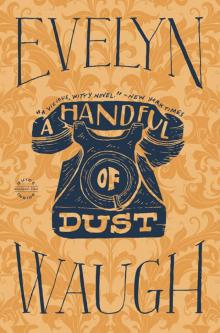 A Handful of Dust
A Handful of Dust Complete Stories of Eveyln
Complete Stories of Eveyln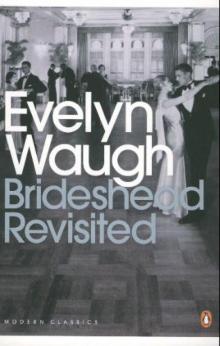 Brideshead Revisited
Brideshead Revisited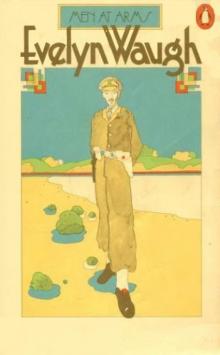 Men at Arms
Men at Arms Black Mischief
Black Mischief When the Going Was Good
When the Going Was Good Officers and Gentlemen
Officers and Gentlemen Helena
Helena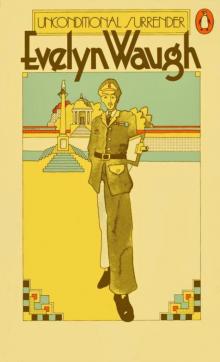 Unconditional Surrender
Unconditional Surrender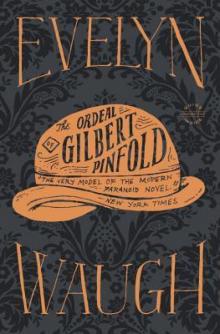 The Ordeal of Gilbert Pinfold
The Ordeal of Gilbert Pinfold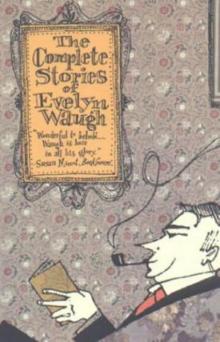 The Complete Stories Of Evelyn Waugh
The Complete Stories Of Evelyn Waugh